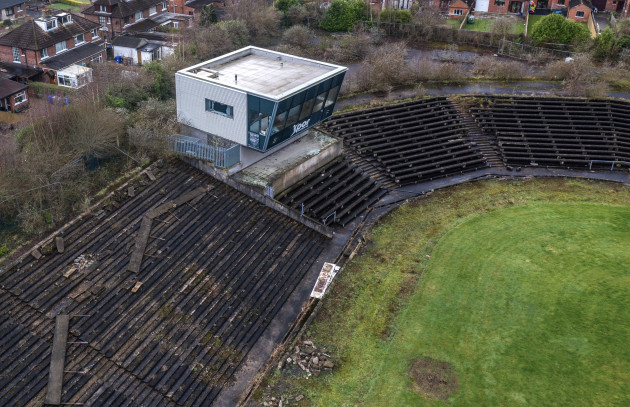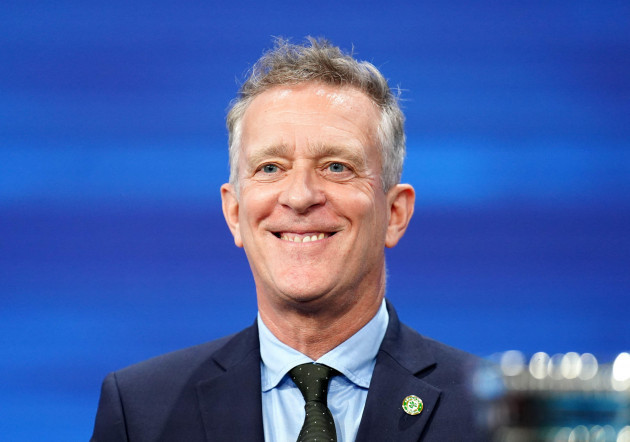TODAY’S CONFIRMATION OF Ireland as co-hosts of Euro 2028 has not brought any clarity regarding the process by which co-hosts will qualify.
European Championship hosts usually qualify automatically, but Uefa were unwilling to reserve five of the 24 spots at the 2028 Euros for all of the co-hosts. The five teams will therefore take part in the Euro 2028 qualifying campaign as normal, with two places at the tournament ring-fenced for co-hosts who do not qualify via the traditional route.
What is unclear is how the sides will be separated if more than two of the co-hosts do not qualify.
The bid proposed basing it solely on the qualification campaign, so in that scenario, the two best-ranked sides who miss out would be parachuted into the tournament. But while Ireland and the UK are the hosts, they are at Uefa’s mercy on this issue. It’s Uefa’s competition, so they will decide on the qualification format.
“We’ve put our position in relation to the overall bid in the documentation”, said FAI CEO Jonathan Hill after today’s announcement at Uefa HQ in Nyon. “That will now sit with Uefa and Uefa will think through all of the issues and apply them accordingly. We don’t know what the timetable for that will be.
“Uefa will take it away and they’ll look at the different options available to them. I just want it to be as fair as I can be, and as I say, I want us to qualify directly.”
FA Wales CEO Noel Mooney – a former League of Ireland goalkeeper and interim CEO of the FAI – said that everything for the tournament must be signed off by 2026, though anticipates clarity around qualification to arrive much sooner.
“Ultimately that is up to Uefa to decide”, said Mooney. “We can put forward whatever we like really, it’s up to them to decide what they want. We are united in what we think is right for the bid, but it’s up to them to make the decision.
“We don’t know if they would include Nations League [results] for example, we don’t know if it would just be the group itself, we don’t know if it would be Fifa rankings, or whatever it is. Our concept would be that it’s performance throughout the [qualification] tournament.”
Cardiff is set to host the tournament’s opening game, along with another five games, the last of which will be a quarter-final. Dublin will host six games, as will Glasgow. Casement Park in Belfast is slated to host five games, with the rest in England, culminating in a Wembley final.
The Irish/UK bid for the tournament was unopposed, and was ratified at a meeting of Uefa’s Executive Committee in Nyon this morning. FAI CEO Hill believes their bid would have won had there been competition. (Turkey initially rivalled the Irish bid, but then switched to joining Italy in a successful bid to share hosting duties at Euro 2032.)
“My initial reaction is we’re very pleased that three years of hard work from David Courell and his team within the FAI along with our partners in Government, Dublin City Council and Aviva has come to fruition”, said Hill.
“There was a certain lack of tension in the room with just one bidder but the hard work had been done in relation to the bid to Uefa which is of a very high standard. It was a very well put-together detailed document, running to 900 pages, and I genuinely believe Ireland and the UK will host a brilliant European Championship.”
The bid’s biggest issue is the current state of Casement Park in Belfast. The stadium has been derelict since 2013, and has been beset by planning delays and legal challenges. Those hurdles have now been cleared, with the UK government committing to funding its redevelopment, the estimated costs of which have now spiralled to €127 million. Northern Ireland secretary Chris Heaton-Harris told the BBC earlier this year that the government will find the money to rebuild the stadium. The redevelopment may yet run into political obstacles, with DUP MLA Stephen Dunne last week voicing his party’s opposition to the use of UK government funds to fund the rebuild, calling on the GAA to increase their commitment of a £15 million contribution.
Irish Football Association CEO Patrick Nelson was bullish on the prospects of Casement being completed on time.
“We have been a partner in this since 2018 when we kicked off the ideas and we hope we’re still going to be a full partner in this by the time he Euros kick off in 2028″, he said. “We have been working with all partners, both on the FA side and the Government side and with the GAA, and the plans are in place for Casement.
“The plans are in place for Casement and the planning permission is in place and we have assurances from the Government that the funding will be made available.”
Asked whether he believed the GAA should increase their contribution to the stadium, Nelson said, “That’s a matter for the GAA, not for us. We have a great relationship with the GAA at Ulster Council level. [Ulster Council CEO] Brian McAvoy and myself speak on a regular basis on all sorts of things. We work on other projects apart from this. The funding of the stadium is primarily a matter for them but we have got the assurances from the Government that funding will be made available, so that’s what we have relied upon.”
When asked for his reaction to the DUP’s opposition to that government funding, Nelson said, “l the DUP can speak for themselves, that’s fine. The Casement Park project has been part of regional stadia programmes since 2011 and the two other parts of that programme have been delivered which is the Kingspan Stadium and our own national football stadium. This is the third piece of that jigsaw and for me it needs to be delivered.”
Taoiseach Leo Varadkar said last week he believes the Irish government should make a contribution.
Asked for his opinion on Varadkar’s commitment of funds to Casement at a time that football facilities across Ireland are in a parlous state, CEO Hill said, “I think [sports] Minister Byrne also addressed that and he’ll be speaking to the Taoiseach’s office. They will decide whether or not the Irish Government will be involved in that process but we’ll leave that to them.
“The important thing about today is that the hard work starts from here. Genuinely and traditionally people talk about legacy in relation to what happens after a tournament but for us we’re seeing the legacy process starting for tomorrow. We see this very much as a catalyst for the ongoing discussions with Government and other stakeholders in relation to facility development because you know our vision is very important to us.”
The FAI today said they will receive €6.2 million as part of a legacy fund from hosting the tournament.




